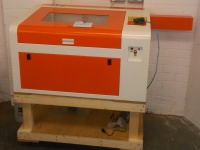6040 Laser Cutter
See Also
The Laser Cutter Manual is a quick refresher for inducted members on how to use the laser cutter.
Berlin FabLab have some fantastic instructions for using VisiCut available here
SVGNest is an online tool for nesting SVG files using space efficiently.
About

In December 2014 we purchased a new A2 laser cutter from China and a LAOS controller board to upgrade it. The laser was delivered in January 2015 and work is currently underway integrating it into the hackspace RFID system so usage can be tracked. It's anticipated that things should be up and running... when it is ready.
After the upgrade the laser is controlled with Visicut. The configuration for Visicut can be automatically installed (as of Mid Feb 2015) by simply selecting Leeds Hackspace from the list of laser cutters on first installation. An additional element using Visicam to work with Visicut has also been added.
An induction on using the laser cutter is required before use by a designated Hackspace inductor. For brief reference there is a simple Laser Cutter Manual to be used as a reminder.
Suggested Cutting Settings
Cutting turns the laser on to the designated power and moves the beam over the surface. The intense heat energy vaporises the material where it is focused, forming a cut. These settings (and more Laser Cutter Settings ) have been tried and tested, with some success. Experiment with them.
| Material | Thickness | Power | Speed | Notes | |
|---|---|---|---|---|---|
| Acrylic | 3 mm | 100 | 14 | ||
| MDF | 3 mm | 100 | 14 | ||
| MDF - vector etch | 3 mm | 60 | 60 | ||
| Laser Ply | 3mm | 100 | 14 | ||
| Card | 150gsm | 60 | 40 | ||
| T-Shirt | 24-25 | 100 | Resolution 300dpi |
Suggested Etch Settings
Etching pulses the laser in order to etch a surface, because the beam is narrow the machine has to make multiple passes to construct your etch and so can take a long time. Currently etching only works unidirectionally bidirectional etching will result in squished output.
| Material | Etch Type | Power | Speed | Notes |
|---|---|---|---|---|
| Macbook | Solid Etch | 60 | 100 | Power 100 gives "feelable" finish, 60 seems nice. |
Usage tariff
Usage of the laser cutter costs £1 per 10 minutes, with a £1 minimum charge. This is to cover the cost of replacing the laser tube, which has a limited lifespan.
Please note: you're charged for the amount of time that your card is inserted into the machine.
Capabilities
The 6040 in the name is a reference to the size of the cutting bed - 600x400mm - given that the home position is not 0,0 we will lose some of that. It is a 60w Laser but it is a cheap chinese 60w laser, we have to not over-expect. The focal length from the centre of the lens to the centre of the cutting piece should be 50.8mm
There are limits to how thick it can cut, but the laser should cut:
- Acrylic sheet
- Plywood
- MDF
- Paper
- Card (with the exception of corrugated card)
You will NOT cut:
- Vinyl (toxic/corrosive fumes)
- Lexan (different toxic fumes)
- Corrugated card (fire risk)
- Food (it smells horrible and gunges up the laser)
You will NOT lick the laser cutter, even when inducted.
"Etch"-able with a mask on material (covered in induction):
- Metal
- Glass[1]
- Ceramics
All of the above need their reflectiveness dealing with or you could damage the laser.
Anything not mentioned above, ask a Laser-inducted director and do not be surprised/upset when they say "hell no!"
A useful guide as to whether they will say yes/no : http://www.originlaser.com.au/laser-materials/
Maintenance
- After use
- Allow laser to cool with water still running before powering off.
- Vacuum out any laser crud that's on/under the bed.
- Ensure you've left the laser clean and tidy.
- Remember your RFID card!
- Periodic
- Clean optics.
- Check coolant levels, top up with distilled water if necessary.
- Check vent tube for any escaped laser crud.
Operational/Installation Maintenance
- Mount laser on trolley - May wish to be re-mounted to ensure cutter is straight
- RFID access - Operational, requires Marvin integration
- Motor Control - There is potentially an operational problem with printing circular complex objects (cogs)